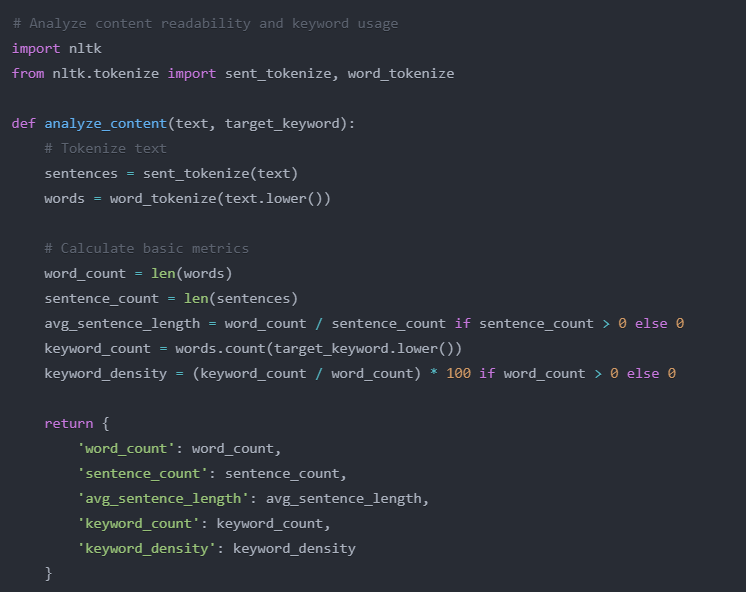Why Python Has Become Essential for Modern SEO Professionals
In today’s competitive digital marketing landscape, automation and data analysis have become essential for successful SEO strategies. Python has emerged as the preferred programming language for SEO professionals seeking to scale their operations, gain deeper data insights, and stay ahead of the competition.
Can Python Be Used for SEO?
Absolutely. Python has become an indispensable tool in modern SEO, transforming how professionals approach technical optimization and data analysis. Its straightforward syntax and robust library ecosystem make it ideal for both beginners and experienced practitioners.
With Python, SEO professionals can:
- Automate repetitive tasks – Save hours on routine work like site audits and reporting
- Analyze massive datasets – Process and interpret SEO metrics that would be impossible to handle manually
- Perform large-scale keyword research – Identify opportunities across thousands of keywords simultaneously
- Build custom SEO tools – Create specialized solutions for unique business requirements
- Generate automated reports – Deliver consistent, data-rich insights on schedule
- Conduct comprehensive technical audits – Identify issues across entire websites efficiently
How to Learn Python for SEO: A Structured Approach
Learning Python for SEO requires a systematic approach that builds from fundamental programming concepts to specific SEO applications. Breaking this journey into manageable steps makes it achievable for SEO professionals regardless of technical background.
1. Master Python Fundamentals
- Learn basic Python syntax and structure
- Understand variables, data types, and collections (lists, dictionaries)
- Master control structures (if/else statements, for/while loops)
- Practice creating and using functions
- Get comfortable with importing and using libraries
2. Focus on SEO-Specific Applications
- Web scraping – Extract data from websites programmatically
- Data analysis – Clean, process, and interpret SEO datasets
- API integration – Connect with SEO tools and platforms
- Automation – Create scripts for repetitive SEO tasks
- HTML parsing – Analyze page structures and elements
- Log file analysis – Extract insights from server logs
Which Python Libraries Are Essential for SEO?
The right libraries dramatically simplify SEO tasks by providing pre-built functionality. These are the most valuable libraries for SEO professionals:
Data Manipulation and Analysis
- Pandas – Powerful data structures and analysis tools
- NumPy – Numerical computing support
- SciPy – Scientific computing utilities
Web Scraping and Parsing
- Requests – Simple HTTP library for API calls
- BeautifulSoup – HTML and XML parsing
- Scrapy – Comprehensive web crawling framework
- Selenium – Browser automation for JavaScript-heavy sites
Visualization and Reporting
- Matplotlib – Basic plotting library
- Seaborn – Statistical data visualization
- Plotly – Interactive, publication-quality graphs
Natural Language Processing
- NLTK – Natural Language Toolkit for text analysis
- spaCy – Advanced NLP library for content optimization
What Are Practical Python SEO Applications?
Understanding practical applications helps bridge the gap between learning Python and applying it to real SEO challenges. Here are key implementations that deliver immediate value:
1. Technical SEO Automation
Python makes it easy to automate routine technical SEO tasks like analyzing metadata across multiple pages, saving hours of manual work and ensuring consistency.

# This simple script analyzes meta tags from a webpage
import requests
from bs4 import BeautifulSoup
def get_page_metadata(url):
response = requests.get(url)
soup = BeautifulSoup(response.text, 'html.parser')
return {
'title': soup.title.string if soup.title else None,
'meta_description': soup.find('meta', {'name': 'description'})['content']
if soup.find('meta', {'name': 'description'}) else None,
'h1_tags': [h1.text for h1 in soup.find_all('h1')]
}What it does: This code extracts the title tag, meta description, and H1 headings from any URL. By automating this process, you can quickly audit hundreds of pages for missing or duplicate meta information—a critical factor for search engine visibility.
2. Keyword Research Automation
When doing keyword research, Python can help process large datasets of keywords to identify patterns, gaps, and opportunities that might be missed manually.

# Group keywords by topic using simple clustering
import pandas as pd
from sklearn.feature_extraction.text import TfidfVectorizer
from sklearn.cluster import KMeans
def cluster_keywords(keywords_list, num_clusters=5):
# Create vectors from keywords
vectorizer = TfidfVectorizer()
X = vectorizer.fit_transform(keywords_list)
# Apply clustering
kmeans = KMeans(n_clusters=num_clusters)
kmeans.fit(X)
# Organize keywords by cluster
df = pd.DataFrame({'keyword': keywords_list, 'cluster': kmeans.labels_})
return df.sort_values('cluster') What it does: This function takes a list of keywords and automatically groups them into related topics based on their semantic similarity. This helps organize large keyword lists into manageable content themes for more strategic SEO planning.
3. Content Analysis and Optimization
Python can evaluate content quality and relevance, helping improve existing pages or guide the creation of new content.

# Analyze content readability and keyword usage
import nltk
from nltk.tokenize import sent_tokenize, word_tokenize
def analyze_content(text, target_keyword):
# Tokenize text
sentences = sent_tokenize(text)
words = word_tokenize(text.lower())
# Calculate basic metrics
word_count = len(words)
sentence_count = len(sentences)
avg_sentence_length = word_count / sentence_count if sentence_count > 0 else 0
keyword_count = words.count(target_keyword.lower())
keyword_density = (keyword_count / word_count) * 100 if word_count > 0 else 0
return {
'word_count': word_count,
'sentence_count': sentence_count,
'avg_sentence_length': avg_sentence_length,
'keyword_count': keyword_count,
'keyword_density': keyword_density
} What it does: This code analyzes content by measuring word count, sentence length, and keyword usage—factors that influence both readability and search relevance. Using this automated analysis helps maintain content quality standards across your website.
How Can You Build Custom SEO Tools with Python?
Creating custom SEO tools allows you to address specific needs that generic tools can’t satisfy. These solutions can provide unique competitive advantages and workflow improvements.
Example: Building a Basic SEO Crawler

# Simple website crawler to find internal links
import requests
from bs4 import BeautifulSoup
from urllib.parse import urljoin
def crawl_site(start_url, max_pages=10):
visited = set()
to_visit = {start_url}
page_data = []
while to_visit and len(visited) < max_pages:
url = to_visit.pop()
if url in visited:
continue
try:
response = requests.get(url, timeout=5)
visited.add(url)
# Parse HTML
soup = BeautifulSoup(response.text, 'html.parser')
# Extract data from this page
links = []
for a_tag in soup.find_all('a', href=True):
links.append(urljoin(url, a_tag['href']))
# Save page info
page_data.append({
'url': url,
'title': soup.title.string if soup.title else 'No title',
'link_count': len(links)
})
# Add new internal links to visit
for link in links:
if link.startswith(start_url) and link not in visited:
to_visit.add(link)
except Exception as e:
print(f"Error crawling {url}: {e}")
return page_data What it does: This crawler starts at a given URL and systematically discovers linked pages within the same website. It collects basic information about each page, including title and link count. This is the foundation for identifying site structure issues, orphaned pages, and internal linking opportunities—critical factors for SEO performance.
What Advanced Python SEO Techniques Should You Learn?
As your Python skills develop, you can implement advanced techniques that leverage machine learning and AI for sophisticated SEO analysis:
Machine Learning for SEO
- Content performance prediction – Forecast how content will perform based on historical data
- Keyword clustering – Group keywords by semantic relevance using algorithms
- Ranking factor analysis – Identify correlations between page elements and rankings
- Traffic forecasting – Predict future organic traffic patterns
Natural Language Processing
- Content quality assessment – Evaluate writing against top-performing pages
- Topic modeling – Identify key themes in successful content
- Entity extraction – Recognize named entities to improve content relevance
- Intent classification – Categorize queries by user intent
API Orchestration
- Create unified dashboards pulling data from multiple platforms:
- Google Search Console
- Google Analytics
- SEMrush
- Ahrefs
- Moz
- Majestic
What Are Best Practices for Python SEO Development?
Following development best practices ensures your Python SEO code remains maintainable, efficient, and reliable:
Code Organization
- Structure projects with clear file organization
- Implement proper error handling with try/except blocks
- Comment code thoroughly for future reference
- Use version control (Git) to track changes
Performance Optimization
- Implement rate limiting to respect server resources
- Use asynchronous operations for network-heavy tasks
- Cache results to avoid redundant processing
- Monitor execution time to identify bottlenecks
Data Management
- Validate input data before processing
- Create regular backups of critical datasets
- Implement efficient storage for large datasets
- Use appropriate data structures for each task
How Do You Get Started with Python for SEO?
Begin your Python SEO journey with these structured steps:
1. Set Up Your Environment
- Install Python (version 3.8+)
- Learn to use virtual environments for project isolation
- Install essential libraries (pandas, requests, beautifulsoup4)
- Configure IDE (VSCode, PyCharm, or Jupyter Notebooks)
2. Start with Simple Projects
- Build a basic site crawler to check for broken links
- Create a tool to analyze meta tags across pages
- Develop a script to extract keywords from a set of URLs
- Automate reporting for common SEO metrics
3. Scale Your Solutions
- Add error handling to make scripts more robust
- Implement logging to track execution
- Create reusable functions and classes
- Build simple user interfaces for non-technical team members
Conclusion
Python has revolutionized how SEO professionals approach their work, offering powerful capabilities for automation, analysis, and optimization. By developing Python skills, SEO practitioners can analyze larger datasets, identify deeper insights, and automate routine tasks that previously consumed valuable time.
The combination of Python programming and SEO expertise creates a powerful skillset that will continue to grow in value as search engines become more sophisticated. Whether you’re just beginning your Python journey or looking to advance your existing skills, investing time in learning Python for SEO will provide a significant competitive advantage in the evolving digital marketing landscape.
Remember that your Python SEO journey is progressive – start with small wins, build confidence through practical applications, and gradually tackle more complex challenges as your skills develop.

“Just remember that you can test different video lengths until you find what works best –– the sweet spot. Pay attention to your video performance and adjust until you see success.”




